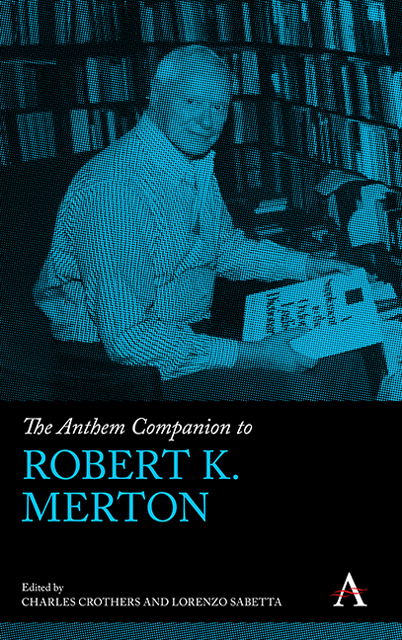Book contents
- Frontmatter
- Dedication
- Contents
- List of Figures and Tables
- Chapter One Introduction: Merton’s Self-Exemplifying Classical Sociological Contributions
- Chapter Two Skeptical Faith, Left Politics, and the Making of Young Robert K. Merton
- Chapter Three Theorist’s Progress: Young Robert K. Merton, 1941–1949
- Chapter Four Taking a Seminar with Merton
- Chapter Five The Development of Mertonian Status-and-Role Theory
- Chapter Six Theory as an Option or Theory as a Must? The Bearing of Methodological Choices on the Role of Sociological Theory
- Chapter Seven “Interviews of a Special Type”: Robert K. Merton and Codification of the Focused Interview
- Chapter Eight Science as a Culture
- Chapter Nine “Providing Puzzles”: Science as Norms and Values
- Chapter Ten A Mertonian Breviary for Cultural Sociologists
- Chapter Eleven The Unpublished Robert K Merton
- Author Biographies
- Index
Chapter Eight - Science as a Culture
Published online by Cambridge University Press: 10 January 2023
- Frontmatter
- Dedication
- Contents
- List of Figures and Tables
- Chapter One Introduction: Merton’s Self-Exemplifying Classical Sociological Contributions
- Chapter Two Skeptical Faith, Left Politics, and the Making of Young Robert K. Merton
- Chapter Three Theorist’s Progress: Young Robert K. Merton, 1941–1949
- Chapter Four Taking a Seminar with Merton
- Chapter Five The Development of Mertonian Status-and-Role Theory
- Chapter Six Theory as an Option or Theory as a Must? The Bearing of Methodological Choices on the Role of Sociological Theory
- Chapter Seven “Interviews of a Special Type”: Robert K. Merton and Codification of the Focused Interview
- Chapter Eight Science as a Culture
- Chapter Nine “Providing Puzzles”: Science as Norms and Values
- Chapter Ten A Mertonian Breviary for Cultural Sociologists
- Chapter Eleven The Unpublished Robert K Merton
- Author Biographies
- Index
Summary
Introduction
In 1933, Robert K. Merton began work on a dissertation inquiring into the advent of the social institution of science and its transformation into one of modernity's central spheres of culture. This work resulted in one of the cornerstones of the sociology of science: Science, Technolog y and Society in Seventeenth Century England (1978[1938b]). Despite its being a Jugendwerk, a denotation Merton himself applied to the study in a late reflection on its aim and substance (1970, vii), it manifests the core features characteristic of Mertonian sociology: a positing of the relative autonomy of the manifold spheres of culture; a focus on motives lending significance to action and their link with institutional imperatives; and an account of substantive conditions shaping historical outcomes. In other early works, Merton specified and interrogated the “ethos of science” (1938a, 1942) and later considered related normative dimensions of science (1957). Merton is rightly renowned for elevating the sociology of science to a central field of inquiry as well as for being a key source of its institutional momentum (Crothers 1987, 50–63). This chapter focuses on Merton's early works so as to emphasize his foundational general theoretical claims and characteristic approach constituting his illuminations of the qualities of science that he would develop upon for the rest of his career.
The most valuable feature of Merton's scholarship—a feature that is of special significance to contemporary sociology—is his methodical effort to ground his analyses in a general theoretical frame of reference. This effort not only fostered the development of his substantively rich picture and integral account of the scientific enterprise but also did much to begin uncovering the sources of what Weber called its Eigengesetzlichkeit or “lawlike autonomy” or “inner logic” as a sphere of culture and the implications of this sphere for modern existence (Weber 2004, 221). The general theoretical frame of reference lends coherence to the several dimensions of his investigations and renders patent what is of general and potentially enduring interest. Merton's work, moreover, displays keen attentiveness to its conceptual and presuppositional points of departure, which reinforces his work's specificity and therein aids other scholars in developing on this work.
- Type
- Chapter
- Information
- The Anthem Companion to Robert K. Merton , pp. 151 - 164Publisher: Anthem PressPrint publication year: 2022

